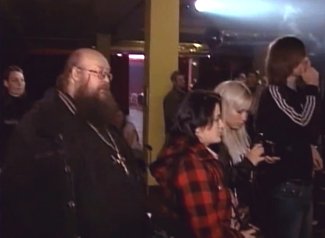By Steve Beard
The symbolism was profoundly countercultural. When Sergei Rybko lumbered onto the stage in between rock bands at a dingy nightclub in Moscow, his appearance was sure to provoke a whiplashed double-take. Draped in a flowing black cassock and adorned with a massive gold cross, 49-year-old Rybko sports a shiny bald head and burly beard that would make the guys in ZZ Top jealous.
 As he looked across the faces of the teens and twentysomethings, he flashed the peace sign—thawing the ice with the nostalgic hand gesture popularized by the disillusioned bohemians of a different era.
As he looked across the faces of the teens and twentysomethings, he flashed the peace sign—thawing the ice with the nostalgic hand gesture popularized by the disillusioned bohemians of a different era.
The heart of his message to the understandably perplexed audience was eloquent and simple. As Rybko looked around the club, he told them that they had come together on that night because, in one way or another, they were a club of lonely-hearts—similar to the “Sgt. Pepper’s Lonely Hearts Club Band” made famous by the Beatles. Under the roof of the club, their hearts are united by the music; but once they leave the range of the deafening decibels, they will be all alone.
“You don’t have to be alone,” he reminds them. “If you reach out to God, you will never be alone.” With a slight bow and another flash of the peace sign, Rybko leaves the stage to the applause of the crowd.
As you might have surmised, Rybko is a Russian Orthodox priest and his unique ministry was recently profiled on ABC News.
Rybko tends to the normal priestly duties of his parish by day, and ventures into the underbelly of Moscow’s rock subculture at night—a mission that was given to him by the late Patriarch Aleksei II, leader of the Russian Orthodox Church who died last December.
Back at the club, a young rocker makes his way over to Rybko. “I wanted to say a big thank you for coming and for his support,” he told ABC correspondent Alexander Marquardt. “I had some questions I didn’t know who to talk to about, so I asked him and explained everything to me.”
Rybko’s expectations are modest. “At least they didn’t throw anything,” he says afterwards. “My job is to sow, it is up to God to cultivate,” he says. “If what I say changes someone, if it makes someone purer, closer to God, then that’s a successful evening.” Quite simply he believes that if the punkers and metalheads won’t come to church, the church should go to them.
In many ways, Rybko is the perfect candidate to reach out to a wayward flock. Before becoming a wandering hippy when he was young, he played in a rock band and led a small group of anarchists in rebellion against oppressive and rigid Soviet communism. “I used to be a rocker and I will always be one,” he reports. “For the average person behind the Iron Curtain, it represented the only truth that you could listen to.”
Those outside the walls of the sanctuary may not be interested in our internal church battles, but they are intrigued by truth—eternal truth that speaks to the heart, mind, and soul.
When Rybko first got involved in the church, he was a bell ringer. He took the opportunity to mix Pink Floyd and Led Zeppelin songs along with the traditional Orthodox bell ringing. According to Rybko, the old ladies in the congregation actually liked the convergence of rock and ritual.
Twenty-one years ago, Rybko was ordained as a priest. Today, he attempts to live out his faith before those inside the sanctuary and those moshing at the rock clubs. “My job as a priest is to bring the life of Christ to the darkest basements,” he says. “In the club, I talk to people who are far away from God…. If I open the Bible [in the clubs] and start to talk like a priest, they will all run away. So I have to use their language but make sure they understand that a priest is speaking to them and that Christianity will solve their problems.”
I have a soft spot in my heart for Rybko’s outreach. When I was a teenager, I used to hang out at a notorious punk rock club called the Cuckoo’s Nest in Orange County, California. Despite having grown up in the church, it ended up being a group of mohawked and tattooed rockers that helped me to embrace my faith.
What really stuck out in the Rybko story was that in addition to hanging out at the clubs, he also opens up a small building behind the sanctuary to bands that need a place to rehearse. Amongst the instruments, amps, and graffiti, there is a large cross on the ceiling and icons of Jesus and the saints displayed on the walls.
As he is getting older, Rybko admits that he usually feels more comfortable preaching in church than hanging out at concerts and clubs. “Thirty years ago that would have been my home,” he says. “Now I feel more at home in church, that is closer to me. But it is my duty to go to the clubs. If I don’t, who will?”
Great question. God bless Sergei Rybko.
Steve Beard is the creator of Thunderstruck.org. This article first appeared on Thunderstruck in October 2009.
